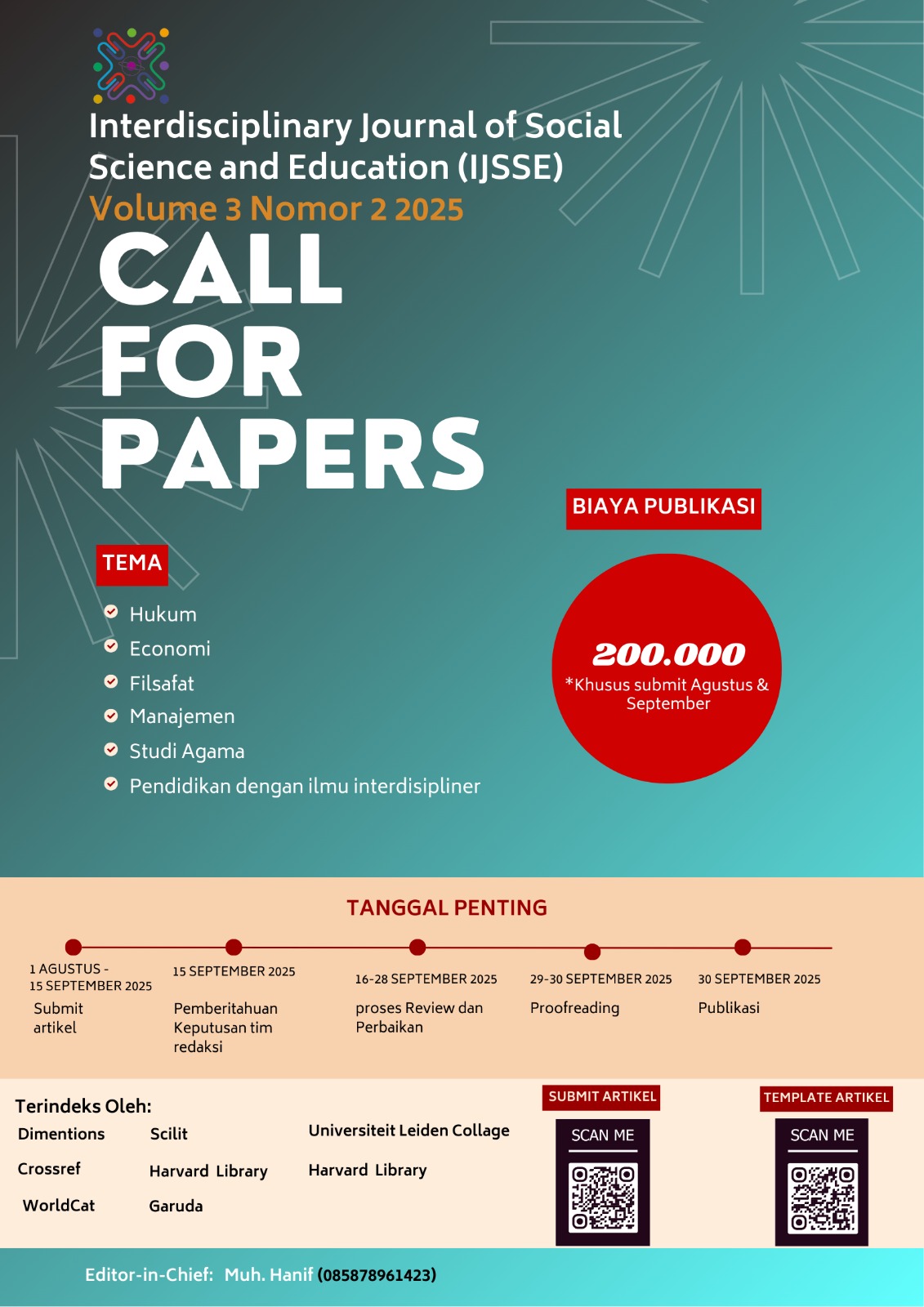The Effect of Islamic Mental Health Psychoeducation as an Effort to Improve Mental Health Literacy in Adolescents
DOI:
https://doi.org/10.53639/ijsse.v1i1.6Keywords:
Islamic psychoeducation, Literacy, Mental health, TeenagerAbstract
The lack of public understanding of mental health creates a negative stigma in society, leading to delays and inadequate treatment in addressing mental disorders. Therefore, this study aims to enhance mental health literacy among adolescents by providing Islamic mental health psychoeducation training. The research subjects were 11 students from Class XI Religion, MAN 1 Banjarmasin, utilizing a pre-experimental research design known as the one-group pretest-posttest design. The measurement tool used was the Islamic mental health literacy scale, and data analysis was conducted using a paired sample t-test. The results of this study indicated a significant difference between the pre-and post-intervention phases, as evidenced by the obtained hypothesis of p < 0.000 (p < 0.05). In conclusion, this research highlights the importance of providing Islamic mental health psychoeducation to improve mental health literacy among adolescents.
Downloads
References
Anditasari, Putri. 2023. “Urgensi Literasi Kesehatan Mental Islami Pada Pendidikan Tinggi Keagamaan Islam (Covid 19).” Khazanah Multidisiplin 4(1):71–96. doi: https://doi.org/10.15575/kl.v4i1.23907.
Ariadi, Purmansyah. 2019. “Kesehatan Mental dalam Perspektif Islam.” Syifa’ MEDIKA: Jurnal Kedokteran dan Kesehatan 3(2):118–27. doi: 10.32502/sm.v3i2.1433.
Aula, Yurida Nor, dan Faridha Nurhayati. 2020. “Hubungan Literasi Kesehatan dengan Perilaku Kesehatan Siswa Sekolah Menengah Atas Negeri Di Kota Surabaya.” Jurnal Pendidikan dan Olahraga 08 No. 1:139–44. doi: https://ejournal.unesa.ac.id/index.php/jurnal-pendidikan-jasmani-issue/archive.
Bhakti, Caraka Putra, dan Shopyan Jepri Kurniawan. 2020. “Konsep Psikoedukasi Berbasis Blended Learning bagi Remaja di Masa Pandemi Covid-19.” 53–60.
Dewi, Retno Lelyani, Imas Kania Rahman, dan Wido Supraha. 2018. “Psikoedukasi Islami Pendidikan Seks Sebagai Medium Alternatif Pencegahan Kekerasan Seks Pada Anak.” 221–31.
Dwiyani, Baiq Fira, dan Erlina Listyani Widuri. 2020. “Psikoedukasi Untuk Meningkatkan Literasi Kesehatan Mental pada Guru dan Siswa di SMPN ‘A’ Yogyakarta.” Universitas Ahmad Dahlan 1–7.
Hamid, Abdul. 2017. “Agama dan Kesehatan Mental dalam Perspektif Psikologi Agama.” Jurnal Kesehatan Tadulako 3 No 1:1–84.
Hastuti, Rahmah, dan Riana Sahrani. 2018. “Psikoedukasi Strategi Mengelola Kelas Bagi Guru Di Sekolah Dasar.” s1, no. 2.
Idham, Azmul Fuady, Puji Rahayu, Azzah A. As-Sahih, Syurawasti Muhiddin, dan M. Arief Sumantri. 2019. “Trend Literasi Kesehatan Mental.” 9.
Istiqamah. 2016. “Layanan Bimbingan Kelompok Sebagai Media dalam Psikoedukasi Anti Kriminal Di Sekolah.” Jurnal Psikologi Al-Qalb, 8, No. 1:25–32.
Jorm, A. F. 2000. “Mental Health Literacy: Public Knowledge and Beliefs about Mental Disorders.” British Journal of Psychiatry 177(5):396–401. doi: 10.1192/bjp.177.5.396.
Jorm, Anthony F., A. .. E. Korten, P. A. Jacomb, H. Christensen, B. Rodgers, dan P. Pollitt. 1997. “Mental Health literacy. A Survey of The Public’s Ability to Recognise Mental Disorders and Their Beliefs About The Effectiveness of Treatment.” Med J Aust, 166 (4):182–86.
Kartikasari, M. N. D., Y. Fitria, F. E. Damayanti, dan Yunike. 2020. Kesehatan Mental. PT Global Eksekutif Teknologi Anggota IKAPI.
Kementerian Kesehatan RI Badan Penelitian dan Pengembangan Kesehatan. 2019. Laporan Nasional RISKESDAS 2018. Nasional. Jakarta.
Masitah, Eis. 2019. “Validasi Modul Literasi Kesehatan Mental Untuk Meningkatkan Self Efficacy Guru Pendamping Dalam Melakukan Deteksi Dini Permasalahan Kesehatan Mental Di Sekolah Berasrama.” Gadjah Mada, Yogyakarta.
Maya, Nanda. 2021. “Kontribusi Literasi Kesehatan Mental dan Persepsi Stigma Publik terhadap Sikap Mencari Bantuan Profesional Psikologi.” Gadjah Mada Journal of Psychology (GamaJoP) 7(1):20–32. doi: 10.22146/gamajop.58470.
Muhammad Mush’ab M, Unik Hanifah Salsabila, Annisa Dwi Mukarromah Hanindraswari, Annisa’ A-syadza, dan Vika Sarika. 2020. “Menjaga Kesehatan Mental Di Tengah Pandemi Covid-19 Melalui Tazkiyatun Nafs.” WARAQAT : Jurnal Ilmu-Ilmu Keislaman 5(2):99–110. doi: 10.51590/waraqat.v5i2.118.
Nizar. 2018. “Hubungan Etika dan Agama dalam Kehidupan Sosial.” Jurnal Arajang 1 No. 1:27–35. doi: https://doi.org/10.31605/arajang.v1i1.44.
Paizin, Abib Taupik, Salman Mubarok, Tsamrotul Fitriyah, dan Yovian Yustiko Prasetya. 2022. “Pengaruh Kesehatan Mental Pada Agama.” Edunity : Kajian Ilmu Sosial dan Pendidikan 01(01). doi: https://doi.org/10.57096/edunity.v1i01.4.
Rachmayani, D., dan Y. Kurniawati. 2016. “Studi Awal : Gambaran Literasi Kesehatan Mental Pada Remaja Pengguna Teknologi. Prosiding SEMNAS Penguatan Individu di Era Revolusi Informasi.” 91–100.
Rifani, Dira Anjania, dan Dedi Riyanto Rahadi. 2021. “Ketidakstabilan Emosi dan Mood Masyarakat Dimasa Pandemi Covid 19.” Jurnal Manajemen Bisnis 18, No. 1:23–34. doi: http://journal.undiknas.ac.id/index.php/magister-manajemen/.
Samain, dan Budiharjo. 2020. “Konsep Kesehatan Mental dalam Al-Qur’an dan Implikasinya terhadap Adversity Quotient Perspektif Tafsir Al-Misbah.” Atta’dib Jurnal Pendidikan Agama Islam 1 No. 2:18–29.
Shihab, M. Quraish. 2002. Tafsir Al-Mishbah Pesan, Kesan, dan Keserasian Al-Qur’an. Vol. 6. Jakarta: Lentera Hati.
Sudirman. 2019. “Hubungan Agama dan Kesehatan Mental.” Scholastica : Jurnal Pendidikan dan Kebudayaan 1 No. 1:1–12.
Yasipin, Silvia Ayu Rianti, dan Nurman Hidaya. 2020. “Peran Agama dalam Membentuk Kesehatan Mental Remaja.” Jurnal Mantiq V No.1:25–31.
Downloads
Published
How to Cite
Issue
Section
License
Copyright (c) 2023 Norhayatun Norhayatun, Musfichin Musfichin, Mulyani Mulyani

This work is licensed under a Creative Commons Attribution-ShareAlike 4.0 International License.
Authors who publish with this journal agree to the following terms:
- Authors retain copyright and grant the journal right of first publication with the work simultaneously licensed under a Creative Commons Attribution License that allows others to share the work with an acknowledgement of the work's authorship and initial publication in this journal.
- Authors are able to enter into separate, additional contractual arrangements for the non-exclusive distribution of the journal's published version of the work (e.g., post it to an institutional repository or publish it in a book), with an acknowledgement of its initial publication in this journal.
- Authors are permitted and encouraged to post their work online (e.g., in institutional repositories or on their website) prior to and during the submission process, as it can lead to productive exchanges, as well as earlier and greater citation of published work (See The Effect of Open Access).


















